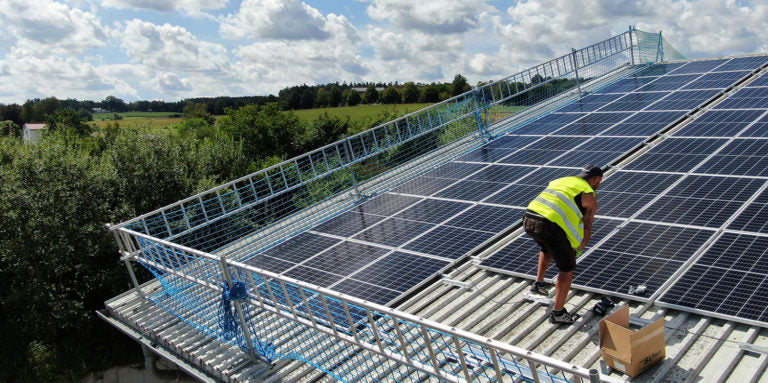https://en.solarbe.com/home/article/info/catId/49/id/5826.html
North Carolina AG asks delay to Duke’s solar net metering plan

Courtesy: Ricardo Gomez Angel/Unsplash
The announcement last November was refreshing to solar energy advocates.
Duke Energy had reached an agreement on changes to its net metering policy for rooftop solar customers in North Carolina that was cheered by most solar industry trade groups. The settlement was similar to an agreement crafted a year earlier in South Carolina that Vote Solar said was rooted in "trust" and "transparency."
The success was notable because policy updates to net metering -- the mechanism that credits rooftop solar customers for surplus electricity that they send to the grid -- have proven to be contentious in other states.
In California, regulators halted a net metering proposal that advocates have said would decimate the rooftop solar industry. And Florida lawmakers recently passed a bill that will eventually phase out net metering altogether.
Opposition to the net metering agreement in North Carolina came from an unusual quarter: rooftop solar installation companies and the state's attorney general, both of which emerged in opposition to the proposed changes in mid-March, months after the proposal was released to positive reviews.
The office of North Carolina Attorney General Josh Stein, a Democrat, wrote in a filing with the North Carolina Utilities Commission that Duke's process to update net metering only examined the costs of customer-sited generation, not the benefits.
The AG's office wrote in its March 15 filing that the potential benefits range from reducing carbon emissions by offsetting fossil fuel generation to improving grid resilience "and they must be investigated and quantified." The filing went on to urge "it would be prudent for the Commission to delay issuing an order in this docket until a later date."

In Oct. 2021, North Carolina Gov. Roy Cooper signed into law a bipartisan mandate that will require the state to reduce carbon emissions by 70% by 2030 and reach carbon neutrality by 2050. (Courtesy: North Carolina Governor's Office)
Duke was required to revise its net metering policy as part of a bipartisan clean energy bill, House Bill 951, that was passed by state lawmakers last fall. The bill directed regulators to establish a Carbon Plan to enable the state to cut carbon emissions by 70% by 2030 and reach carbon neutrality by 2050.
Duke's net metering policy proposal would impact customers who submit applications on or after Jan. 1, 2023 and would remain in effect for 10 years. Existing rooftop solar customers would remain in their current net metering policy until 2027.
The policy included a minimum monthly bill of $22 for Duke Energy Carolinas customers and $28 for Duke Energy Progress customers. NEM credits would be priced based on time of use and peak hours, instead of retail or wholesale prices. A grid access fee would be charged to customers with systems of 15 kW-dc or larger. Also included was a non-bypassable charge for "non-energy expenses" to cover storm damage and related costs to maintaining the grid.
The N.C. Sustainable Energy Association, Southern Environmental Law Center, Vote Solar, Southern Alliance for Clean Energy, Sunrun, Solar Energy Industries Association (SEIA) all supported the settlement when it was reached in November.
"This is a step in the right direction for the Southeast and is an example of the ways that smart energy policy can unlock the full potential of rooftop solar, especially when paired with storage and other smart energy technologies," Will Giese, regional director Southeast at SEIA, said at the time.

Duke Energy defended its net metering proposal in North Carolina, saying it will "help customers use energy more efficiently." (Photo courtesy: Duke Energy)
Now, the weight of the state's Attorney General's office is behind the push to delay the policy change.
Meanwhile, the owners of three rooftop solar installation companies in North Carolina -- Sundance Power Systems, Southern Energy Management, and Yes Solar Solutions -- have filed a request to intervene in the process.
In a letter to North Carolina Gov. Roy Cooper dated March 10, the companies claimed Duke's net metering proposal would lead to job losses and would negatively impact the state's climate goals.
"The time-of-use rates, critical peak pricing, minimum bill, complicated netting procedure, non-bypassable charges, and variable treatment of existing customers create such complexity that it would become quite difficult for us to model for our customers what the payback on their solar investment would be," the companies wrote.
In total, 15 companies signed on to the letter.
A Duke Energy spokesperson responded to the concerns in a statement to Renewable Energy World.
"Duke Energy believes it is important to move the net metering discussion forward and begin to build new solar programs that will help customers use energy more efficiently. We feel our proposed agreement and filings do that," the company said.
Renewable Energy World has contacted SEIA, the industry's leading trade group, to see if the organization's position has changed in light of the recent opposition.



